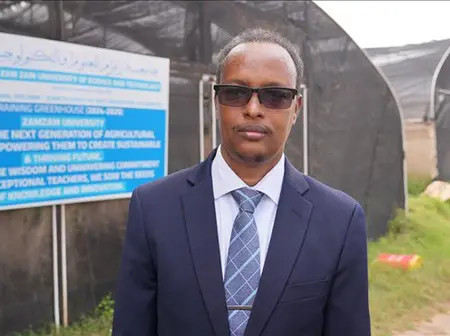– University’s Faculty of Agriculture is ‘one of the main human capital producers in Somalia in agriculture,’ says Mohamud Mohamed Hassan Harbi
MOGADISHU, Somalia/ISTANBUL: Zamzam University of Science and Technology (ZUST) in Somalia is making strides in tackling the country’s food security issues by increasing agricultural production.
The Mogadishu-based university, supported by Turkish institutions such as the Turkish Cooperation and Coordination Agency (TIKA) and the Humanitarian Relief Foundation (IHH), offers modern agricultural technologies at its Faculty of Agriculture, where research and experiments are conducted and agricultural products are cultivated in greenhouses.
“We are very proud to say that one of Zamzam University’s main impacts in Somalia is improving food security to a certain degree,” ZUST Rector Mohamud Mohamed Hassan Harbi told Anadolu, citing the university as the first to bring greenhouse farming to Somalia.
The primary production in the university’s greenhouses includes tomatoes, peppers, cucumbers and various other vegetables, along with fruits such as bananas, mangoes and watermelons.
Training a new generation of farmers
Harbi said that after Turkish President (then Prime Minister) Recep Tayyip Erdogan’s 2011 visit to Somalia, IHH, TIKA and the Zamzam Foundation discussed how to train qualified farmers capable of boosting the country’s agricultural and food production capacity, as well as strategies to combat hunger in Somalia.
“The faculty is one of the main human capital producers in Somalia in agriculture,” he said.
Harbi said the faculty’s establishment marked the first step in advancing agricultural production, adding the university has since focused on teaching young people how to effectively apply modern farming technologies.
He said after two years of training youth through short courses and diplomas, they established the ZUST in 2014 with the Faculty of Agriculture.
The goal was to build capacity in food sustainability and production, later expanding to include health and medicine, and engineering and technology faculties, he added.
Overcoming water challenges to boost food security
While Somalia faced significant challenges in food production and security over the past 20 years, Harbi explained, the ZUST has trained high-quality farmers over the last decade who now work with the Agriculture Ministry and various states to improve food production across the East African country.
He said they began bringing farmers to the university to demonstrate how environmentally controlled greenhouses can help maximize water usage and increase farming production.
“Now Mogadishu’s vegetable production depends on farmers that we train, graduates that we produce,” he underscored.
While Somalia has two rivers and rich soil, many farmers depend on rainfed agriculture, Harbi said, because they cannot afford generators to pump water from the rivers, which is one of the most difficult challenges they face.
“If they get support for how to utilize the rivers and how to utilize well water from the groundwater, I think we can help the farmers produce enough food for Somalia,” he noted.
Cultivating a path to food security
Abdirizak Mohamed Sheikh Abdi, the faculty’s deputy dean and a Türkiye graduate, said agriculture was largely absent due to Somalia’s civil war, but with greenhouses established in 2012 through a collaboration between TIKA and the Zamzam Foundation, the locals learned that corn could be harvested 3-4 times a year.
He highlighted that food security is ensured through agriculture by teaching students modern farming technologies over four years, preparing them to tackle the country’s food shortage through high production.
Sesame and wheat are also grown, Abdi said, adding that wheat cultivation was made possible through trials conducted at the university.
“If the right steps are taken, there will be no famine or food crisis in Somalia,” he stressed.

Leave a Reply